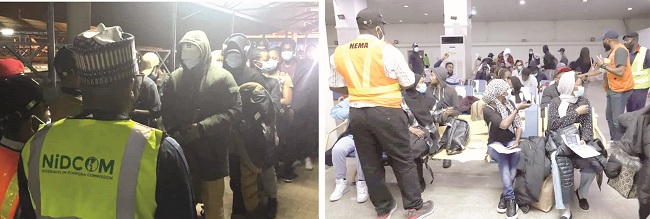

The crisis that erupted recently in Sudan has caused multitudes including Nigerians and other foreigners to flee the country. PAUL OMOROGBE, KAZEEM BIRIOWO and JUSTICE NWAFOR examine the response by the Federal Government in evacuating citizens home to safety.
The fighting that erupted in the Sudanese capital, Khartoum, which has spread to other parts of the country, is a direct result of a vicious power struggle within the country’s military leadership.
The widely reported clash that broke on Saturday, April 15, is between the regular army and a paramilitary force called the Rapid Support Forces (RSF).

The crossfire started with shooting on 15 April following days of tension as members of the RSF were redeployed around the country in a move that the army saw as a threat.
A lot of talks were held to resolve the situation but it seems to be an effort in futility as this could not resolve the situation.
It is disputed who fired the first shot, but the fighting swiftly escalated in different parts of the country with more than 400 civilians dead, according to the World Health Organisation (WHO).


FG’s efforts to evacuate citizens from Sudan
Just like other countries, the Federal Government of Nigeria began efforts to evacuate its citizens from the crisis in Sudan.
The chairperson of Nigerians in Diaspora Commission (NIDCOM), Abike Dabiri-Erewa, at the weekly ministerial briefing held on Thursday, April 27, organised by the Presidential Communications Team disclosed that about 5,500 Nigerian students in Sudan will be evacuated.
Dabiri-Erewa further said there are over three million Nigerians residing in Sudan and efforts are being made to evacuate as many Nigerians as possible if the war persists as priority will be given to children, students and women.
Dabiri-Erewa said already, 13 buses carrying Nigerians have departed Sudan for the Egyptian border Aswan, from where the returnees would be airlifted back to Nigeria. The first batch was expected in Nigeria on Wednesday, her spokesperson quoted her as saying at the briefing.
FG approves $1.2 million for evacuation
The Federal Executive Council (FEC) approved the sum of $1.2 million dollars for the immediate evacuation of Nigerians.
According to the Minister of Foreign Affairs, Geoffrey Onyeama, the amount will be spent on the hiring luxury buses that will transport stranded Nigerians from Khartoum, the Sudanese capital to Egypt, from where they will be airlifted to Nigeria.
“$1.2 million dollars is what we’re being charged for all the 40 buses. We have huge transport luxury buses made available to us to transport our citizens to the Egyptian border,” he said.
Ethnic profiling of evacuees allegation
An allegation of blocking a particular ethnic group from Nigerian from boarding the bus in Sudan was made by the Coalition of South East Youth Leaders, (COSEYL), in a statement signed by one Hon Goodluck Ibem, against the chairman of NIDCOM, Hon. Abike Dabiri-Erewa.
However, NIDCOM refuted the allegation. It said that every Nigerian who showed up at the point of pickup have all been moved in 40 buses towards Port Sudan or the Egyptian border.
NIDCOM in a statement signed by the Head of Media and Publicity Unit, Abdur-Rahman Balogun explained that: “Reports from the Ministry of Foreign Affairs staff on ground in Khartoum indicated that when the boarding of buses began, the situation was so chaotic that some people (including non-Nigerians) jumped in violently, some with daggers, and through the windows.
“To bring sanity and to abide by the instruction of the Minister of Foreign Affairs that priority should be given to women, children and students, the officials started calling them in according to states in alphabetical order, beginning with Abia State.
“Reports from Sudan indicate that all who converged at the prescribed locations, were to be picked up, have all been moved in 40 buses either towards Port Sudan or towards Egyptian borders.”
NIDCOM/NEMA confusion
The Speaker of the House of Representatives, Hon. Femi Gbajabiamila, on his resumption from the two weeks Easter and Ramadan recess, expressed grave concern over the inter-agency disagreements arising from overlapping mandates and the absence of established operational guidelines for such.
The Speaker said: “I have requested the chairman of the House Committee on Foreign Affairs to invite the honorable Minister of Foreign Affairs and officials from the Nigerians in Diaspora Commission (NIDCOM) and the National Emergency Management Agency (NEMA) to appear before the House to give an account of the status of evacuation efforts.
“The House is aware of ongoing difficulties with the evacuation efforts and the Federal Government’s response to the developments in the Republic of Sudan.
“We are also mindful that some of these difficulties flow from inter-agency disagreements arising from overlapping mandates and the absence of established operational guidelines for such circumstances.
“While our priority is to ensure the welfare and well-being of our fellow citizens caught in this war, we must further revisit the statutory and other frameworks that have left us seemingly unprepared to respond promptly and effectively.
“The conflict in the Republic of Sudan reminds us once more of the fragility of nations.
“In pursuing our political objectives, we must never lose sight of the fundamental truth that in war, everybody loses; in peace, everybody can win.
“All our personal, partisan and sectional interests must always succumb to the overarching and overriding interest of ensuring the unity and stability of Nigeria.
“If we fail in this regard, nothing else will matter, and none of us will be absolved in the judgment of history.”
First batch arrive Abuja Wednesday night
The first batch of evacuees arrived at the Nnamdi Azikiwe Airport, Abuja on Wednesday night, May 3, at about 11:35 pm.
The 376 returnees who took off from Aswan, Egypt, were airlifted by the Nigerian Air Force onboard the NAF C-130H aircraft at about 4pm.
The evacuees experienced some delays as a result of the formalities issued by the Egyptian authorities to enable them to be airlifted to Nigeria.
Federal Government’s delegation at the airport to welcome the returnees included: Minister of Humanitarian Affairs, Disaster Management & Social Development, Sadiya Umar Farouk; Director General, National Management Emergency Agency (NEMA), Ahmed Mustapha and Chairman/CEO of the Nigerians in Diaspora Commission (NIDCOM), Abike Dabiri-Erewa.
Evacuees get N100,000 each
The Minister of Humanitarian Affairs disclosed that each of the returnees would be given N100,000 to enable them settle in.
The NEMA Director General, Habib Ahmed Mustapha, further disclosed that four aircraft were expected to arrive on Thursday, that conveying almost 400 persons.
According to him, Azman Air had joined Air Peace in the evacuation effort. The returnees were screened by officials of Federal Ministry of Health upon arrival in the country.
While giving update on the delay experienced by the stranded Nigerians, one of the officials said: “Two aircraft, Air Peace and NAF C130, are supposed to airlift 350 passengers.
“Unfortunately, 26 additional persons sneaked into the buses. The Egyptian personnel were there.
“They counted and they found 376 Nigerians. They refused the 26 people to stay back at the airport and they also refused to allow Nigerian officials to take the 26 people back to the border.
“Now, they want everyone to leave. Neither will they allow them to go back to the border.
“The only option is to overload the aircraft. The pilots were consulted and they said they could not airlift more people and have plenty of luggage,” he stated.
The Air Peace plane arrived at 11:35pm with 278 passengers while NAF C130 arrived at 11:55pm with 98 passengers.
How other countries responded
United Kingdom (UK) authorities came under fire about 10 days after the crisis broke out as some residents of the nation cried out that they felt abandoned.
The UK government announced a comprehensive evacuation plan less than 48 hours later. “The first flight has departed, and you can anticipate that there will be at least two more flights overnight tonight,” an official spokesman for Prime Minister Rishi Sunak, who spoke to reporters on April 25 said. The Royal Navy of the United Kingdom conducted the operation.
The government said that some 4,000 Britons with dual nationality and 400 with UK-only passports are in Sudan, while 2,000 people registered with the foreign ministry seeking help to get out.
The vulnerable, elderly, and children were given priority on the flights, which took off from an airfield to the north of Khartoum. Only if contacted, Britons were urged to arrive at the airfield.
The involvement of 120 British forces, according to Defence Secretary Ben Wallace, and the presence of Royal Marines in Port Sudan were to “establish the area’s safety and any options.”
He continued that would open up the possibility of a seaborne evacuation via the Red Sea and allow for an increase in support should it be required.
According to Wallace, the area received two ships from the Royal Navy: the frigate HMS Lancaster and the support ship RFA Cardigan Bay.
With 300 Sudanese refugees on board, the first flight made a successful landing in the UK on April 26. Since then, the evacuation has continued, and as of May 1, the UK government reported that it had completed the longest and largest airlift by a Western nation during the crisis, transporting 2,197 people to safety from Sudan.
The RAF deployed more than 1,000 personnel, flew more than 20 flights, evacuated civilians, and assisted nationals of more than 20 nations in returning home in a single week.
The HMS Lancaster will remain in Port Sudan, and her crew will continue to assist in providing support, according to the UK government.
The US response
On April 23, US special operations forces used helicopters that took off from a base in Djibouti and refueled in Ethiopia to evacuate all American diplomats and their families from the US Embassy in Khartoum due to safety concerns. Throughout the evacuation, they were not attacked. In the course of the operations, a number of diplomats from other nations were also evacuated.
On April 29, the US government issued a statement announcing the safe arrival at Port Sudan of a convoy it had organised, including US citizens, local employees, and nationals of partner and ally nations. Those who could enter the US and US citizens then continued on to Jeddah, Saudi Arabia, where more American personnel had been stationed to help with consular and emergency services.
According to the government, “this effort built on the work already done to make it easier for hundreds of other Americans to travel abroad via land convoys, flights on partner aircraft, and ships, as well as our diplomats who left with military assistance. Through these options, which were made possible by the US government, hundreds of US citizens and legal permanent residents have left Sudan.”
Many US citizens, who the government claimed were Sudanese Americans, have complained of being left behind despite the evacuations taking place quickly. The White House declared that until the security situation in Sudan no longer necessitates their presence, U.S. military forces will be stationed in Djibouti to protect American personnel and others. It declared that more forces are ready to move into the area if necessary.
France
The cooperation among European nations is one of the factors to note in the evacuations. Evacuations by EU nations included friendly and ally nations in addition to their own.
On April 23, the French government announced that the “rapid evacuation operation” had begun and that assistance would also be provided to citizens of “allied partner countries” and Europe. That day, 388 people were ultimately taken out of Sudan, according to the New York Times.
As part of the evacuation operations from Sudan carried out in coordination with the Ministry for the Armed Forces on April 26, the French Minister for Europe and Foreign Affairs, Mme Catherine Colonna, and the Minister Delegate for Foreign Trade, Economic Attractiveness, and French Nationals Abroad, M. Olivier Becht, welcomed 184 French citizens and their families as well as about 20 other nationals, including the European Union delegates from Djibouti.
Expert opinions on Nigeria’s response
Nigerian Tribune sought the views of professionals in the fields of diplomacy, peace and conflict on the response of Federal Government and its agencies to Nigerians caught in the Sudan crisis.
Professor Olawale Albert is a professor of African History, Peace and Conflict Studies at the University of Ibadan.
He explained that: “There is what we call citizen diplomacy. This has to do with projecting your country to the rest of the world by how you treat your own citizens. It is on record that we do not treat our citizens well. We had problems in South Africa and it was difficult evacuating our citizens back home. We had it in Ukraine, we had it in Ghana. Everywhere there is a crisis in the world Nigerians are left behind.
“There is nothing that is happening in Sudan that is novel to me. We are used to it, and my prayer is that the world will stop having problems. Because wherever there are problems in the world, Nigerians there will suffer for it. We are going through the usual poor treatment of Nigerians abroad by Nigerians.”
As a solution, Professor Albert had this advice for the incoming administration:
“The incoming president himself should be altruistic. He should choose to serve the best interest of the country. The problem we’ve had is that successive leaders have not been truly interested in developing the country.
“Tinubu should be different by saying that he is here to serve Nigerians. Once you are here to serve Nigerians, that step will affect who you work with, your policies and policy implementation. Then it will force you to put in place mechanisms for monitoring your policies and evaluating your policies.”
Ambassador Dare Bejide was Nigeria’s envoy to Canada. He told Nigerian Tribune that “It is unfortunate that the Federal Government had to wait until the crisis degenerated to its present level when it has become extremely difficult to evacuate Nigerians especially those resident in Khartoum and other towns around the capital.
“The war has become so fierce that movement towards the borders has become increasingly dangerous. This is particularly true because of the large population of Nigerian students in Sudan.”
The former Nigerian High Commissioner added that, “In future , the Embassy should be more proactive in a matter affecting the lives of the citizens. The welfare of the citizens is the most important function of the officials.”
Professor Tunde Adeniran was Nigeria’s ambassador to Germany from 2004 to 2007. He had this to say: “I am not surprised by the general silence of the Nigerian people on the crisis and bloody conflict in Sudan. This is because there has not been sufficient information and enlightenment by the media. The concerns expressed thus far have revolved around Nigerian citizens trapped as a result of the terrible situation in the country.”
Adeniran, a former minister of education and professor of Political Science, said: “Nigerians need to know about the domestic situation, the contending issues and the power tussle, the roles of external powers and forces, especially the United States and Russia, who is supporting which group and for what reasons as well as the implications for Africa.”









